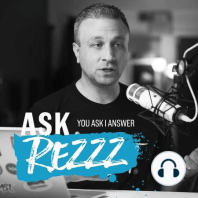9 min listen
A161 - How to answer objections and get clients to say “yes”?
FromAsk Rezzz
ratings:
Length:
8 minutes
Released:
Oct 8, 2018
Format:
Podcast episode
Description
In business, there is this scenario that gets created during sales that put 2 parties on opposite sides of the table. But the reality of it is that both parties want the same thing. They both want to be successful with the project.When the objections start popping up, I like to bring this up to them. I simply share something that I’ve said for years and it’s this. “I want to get you where you want to be as efficient as we can together. We are both working towards that same goal and both are successful when that goal is crushed.”I had a one-hour coaching session with someone (who I got permission to share this on the show) where she wanted to learn more about how to answer objections of clients and get them to commit but in face-to-face conversations and email.## Need to come into the conversation without biasThe simple reason is that they’re more than likely been here before. Maybe not to the extent or the exact service you are pitching, but the internet is now 20+ years old and no doubt they’ve had their business website up and running before.When you come into a sales conversation, you should meet the lead where they are, not where you are.Don’t assume anything. Don’t assume that they had a great relationship with a past vendor. Don’t assume that they know what it’s like to get a proposal and what to do with it.Don’t assume they know what the words mean that are coming out of your mouth. Don’t assume that they even have the most basic of information like who they host with on hand.Which is why it’s so important to get out in front of these questions by way of your project brief or project application. If there is information that you need to better present your solution and you can get that in an online form someplace and allow the lead some time to gather this information, do it. Be empathic. Don’t make them feel bad by putting them on the spot with a question that they can answer easily given a few minutes of time.Embrace ObjectionsObjections are your opportunity in any conversation to connect with the other person, to ultimately solve their problem.This is where, in the limited time you have here, to build that trust up even further.So when you start to hear objections or them becoming a bit apprehensive, come from a place of empathy and understand what their concerns are.Why are they apprehensive and not ready to say “yes” and start the project right now.What is the ask?Chris Do, from The Futur worded this best when he said: “Ask them back for clarity.”What I’ve found to work is to start asking honest, genuine, questions around exactly what it is that the client wants to be done.You want them to actually use the words they have in their head to explain what it is that they want you to do.They’ll often say something that is a bit over the top (or as Chris puts it, “ridiculous”).The idea is to get them to verbalize it because when they do, it’ll hit them, especially as a business owner, that it is just that, ridiculous.Plain and simple, just get them to state it by asking questions and re-stating back what you hear. And the key part to this, is to ask and shut up. Let them answer and allow them to see that the request may be unreasonable.## Lower the risk factorThe ridiculousness usually come by way of asking for a lot of service work for a little bit (or no) money.At that moment, you know they are risk-averse. It’s now your job to lower that risk. I’ve talked before about how you can lower the risk factor by scaling back and lowering risk is one of the best reasons to niche down your business.At this moment you want to express your empathy to their situation. If you know they’ve had a difficult time with a previous vendor or it’s a big chunk of money, restate that by saying “I understand and can appreciate your experience with the past developer, but here’s how we are going to mitigate that and why it won’t happen when working with me.”I would even ask them what happened with the past vendor. Ask them “What happened? What
Released:
Oct 8, 2018
Format:
Podcast episode
Titles in the series (100)
How do you build a sales pipeline: Sales is hard as a freelancer. Even myself tend to leave it behind until I need it. But that's the wrong way to do it. Freelancing businesses need a healthy pipeline in order to be stable, profitable, and build a successful business. There isn’t a silver by Ask Rezzz
